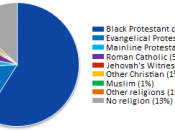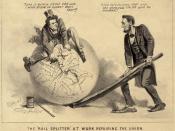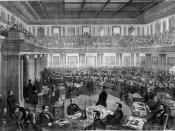Despite the fact that Lincoln passed laws and amendments that were suppose to help in the equalizing of America the reconstruction was not a success, because it was never totally completed. "Although slavery had been abolished with the 13th amendment, the white people of the South were determined to keep the Negro in his place, socially, politically, and economically." (http://www.nv.cc.va.us/home/nvsageh/Hist122/Part1/ MissBlCode.htm). African Americans may have been freed from slavery, but they still had to endure the cruelty of the Black Codes. Reconstruction could have been successful if the laws passed in Washington could have
been brought to the Southern states and enforced. At the time though, the states had a lot of power and the national government was weaker than it is today in enforcing national rule, thus the laws regarding African Americans from state to state. If Lincoln would not have been killed there might have been a stronger emphasis placed on the rights of all citizens.
It would have been extremely difficult to change the minds of people in the
South, but since Lincoln had ideas to change the south there may have been better relations with African Americans and southern whites, where as when President Andrew Johnson took office, being that he was "as eager
as other white southerns to restore white supremacy" (Roark 547). Unfortunately we still live in a prejudicial world, so reconstruction-era issues persist to present day because prejudice has not faded. Today
there are still cases of discrimination and prejudice due to the color of skin, an accent, or merely a different view on an issue. Yes, laws and amendments are passed, but not all follow the rules.
Sources
Roark, Johnson, Cohen, Stage, Lawson, Hartman. The
American Promise. A history of the United States. Volume
II: From 1865. Second Edition. Boston. Bedford/ St.



Slightly vague
its a good start,but you need to back it up with more examples and make your arguments stronger
3 out of 3 people found this comment useful.